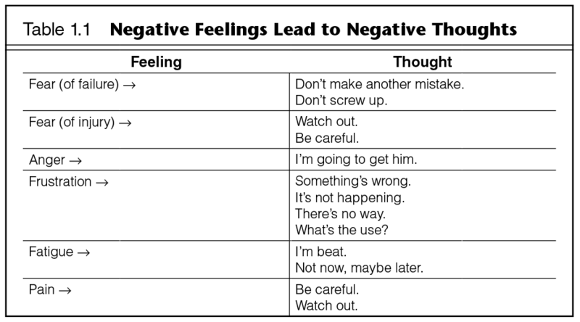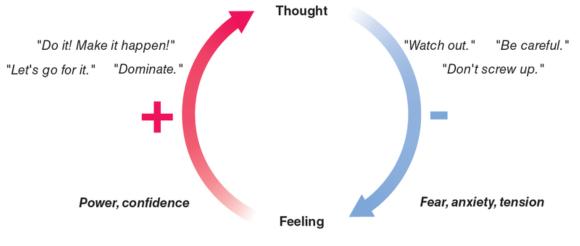Managing Your Mind
This is an excerpt from Hockey Tough 2nd Edition by Saul L. Miller.
The way you manage your thinking and feelings (your mind) is basic to how you perform. It's up to you. Improving your game begins with taking responsibility for managing your mind. I believe there are three key operating principles for managing your mind effectively.
The first principle is that the mind is like a TV set. It's always on, thinking thoughts, running images, and creating feelings. What's important to understand is that you control the remote on that mental TV. You're the boss. You're in control. If you don't like what you're watching, if what you're watching doesn't give you power or doesn't feel good to you, then change the channel.
Being hockey toughis about your ability to stay on the power channel. My job as a sport psychologist is to show you two things: how to change channels on your mental TV and how to develop better-quality programs to tune in to.
The second principle of effective performance is that you get more of what you think about. Because of a mental phenomenon called lateral inhibition, whatever stimulus you focus on becomes magnified in your perceptual field while all other stimuli are downplayed. If you are worried and focus on thoughts and feelings that cause you anxiety (e.g., failure, embarrassment, pain, or disappointment), these thoughts and this reality will become magnified in your mind. Thinking thoughts such as, We're going to blow this lead, This guy is impossible to check, How am I supposed to play with these guys as my linemates ? or I can't put the puck in the net increases the likelihood of a negative performance.
Many players are negative thinkers. At a midget AAA team meeting, I asked a 16-year-old player how many shots he usually took in a game. After thinking a moment, he said, "Five or six." Then he added, "And I'll probably miss the net on all of them." With thinking like that, he's probably right.
You may say, "Well, he's just a kid." Larry Robinson, an NHL Hall of Fame defenseman with 18 years of NHL coaching experience, remarked that the pros are just as hard on themselves. "Too many guys [in the NHL] come off the ice and dwell on their mistakes," he says. "There's not enough focusing on the positive aspect of the game."
On the other hand, if you concentrate on the things you want to make happen on the ice (e.g., moving your feet, keeping your head up and on a swivel, passing tape to tape, going hard to the net, releasing quickly, shooting the puck, shooting accurately, keeping your stick on the ice, finishing your check, and clearing the front of the net), you will increase the probability of these things happening. Positive results will follow.
It's important to think positively and to put positive power programs on your mental TV. Sounds simple, yet few people are able to stay tuned in to positive thoughts and feelings all the time. Experts tell us that we think 50,000 to 60,000 thoughts a day. For most people, more than 80 percent of their thoughts are negative or self-critical. Which brings us to our third principle.
The third principle is that feelings affect thoughts and thoughts affect feelings. This explains why we sometimes get stuck on negatives even though we know we should think positively. It boils down to the way we're wired as human beings, the way our nervous systems work. Every time we have a feeling, a thought automatically goes with it. If the feelings you are experiencing are fear, pain, or uncertainty, the thoughts you'll think will tend to be stress-inducing and limiting. On the other hand, if you feel strong, energetic, and in control, your thoughts will be more positive and your confidence will grow.
The feelings that most frequently limit hockey players have to do with fear, anger, frustration, fatigue, and pain. Table 1.1 shows some examples of how negative feelings can affect thinking.

Negative, limiting feelings can produce negative, limited thinking, which in turn feeds back more negative feelings, creating a negative loop that can become a trap (figure 1.1). That's exactly what a slump is all about: negative feelings, usually anxiety, producing and feeding negative thoughts that create more negative feelings.

The loop of negative thoughts and negative feelings can lead to a slump.
Lou was a 30-goal-a-year scorer in the NHL. He told me that during those high-performance years, he went to the net with confidence and abandon. He felt strong, fast, and self-assured, and he just went for it. Then something unfortunate happened. As he drove to the net on a scoring chance, he was slashed across the face. The slash cut him badly and broke his jaw. After that injury, his feelings and focus changed. He lost some hockey toughness. He noticed he was tentative about going to the net. Instead of thinking, I'll score, he began to think, Watch out. He was looking to avoid a check as often as he was trying to put the puck in the net. As his feelings and focus changed, his goal production dropped dramatically and his career faltered.
Lou's scoring touch recovered as a direct result of his becoming a better mental manager and learning to change the channel from feelings of fear - and the thoughts that go with fear - to feelings and thoughts of power and impact.
Excellence in hockey, as in any sport, is a function of mind and body working together effectively. It's about smooth, coordinated function between thought and action. Excessive tension and fearful or negative thoughts cause a separation or disintegration of the mind - body unit that limits on-ice performance. The question is, how can we reduce these limiting negative thoughts and feelings? Understanding how the mind works and learning techniques to create powerful feelings and productive, positive thoughts will enable you to create a hockey tough state in which you can play your best.
Learn more about Hockey Tough.
More Excerpts From Hockey Tough 2nd EditionSHOP

Get the latest insights with regular newsletters, plus periodic product information and special insider offers.
JOIN NOW
Latest Posts
- How do I integrate nutrition education into PE?
- How does the support of friends and family influence physical activity?
- What makes the Physical Best approach unique?
- Strength training gimmicks . . . or not?
- How do vitamins and minerals support our bodies?
- Why do many people have difficulty losing weight?


